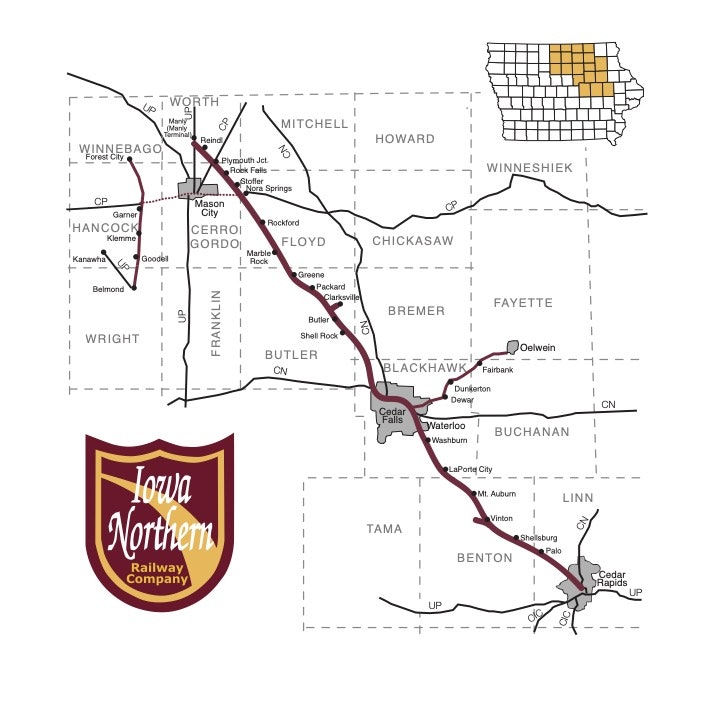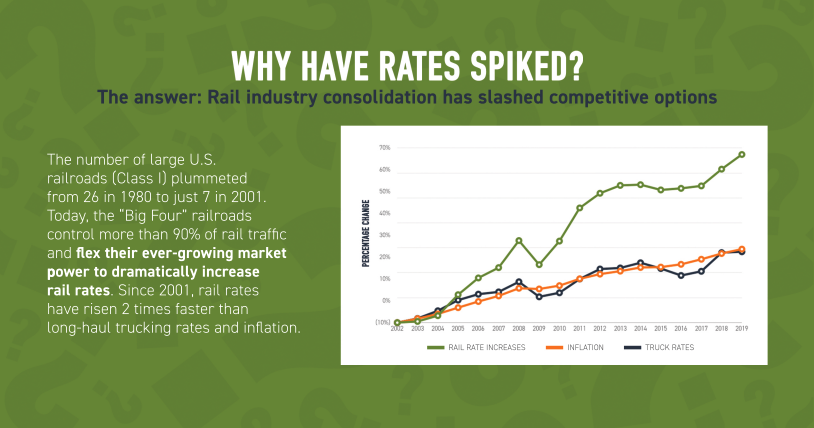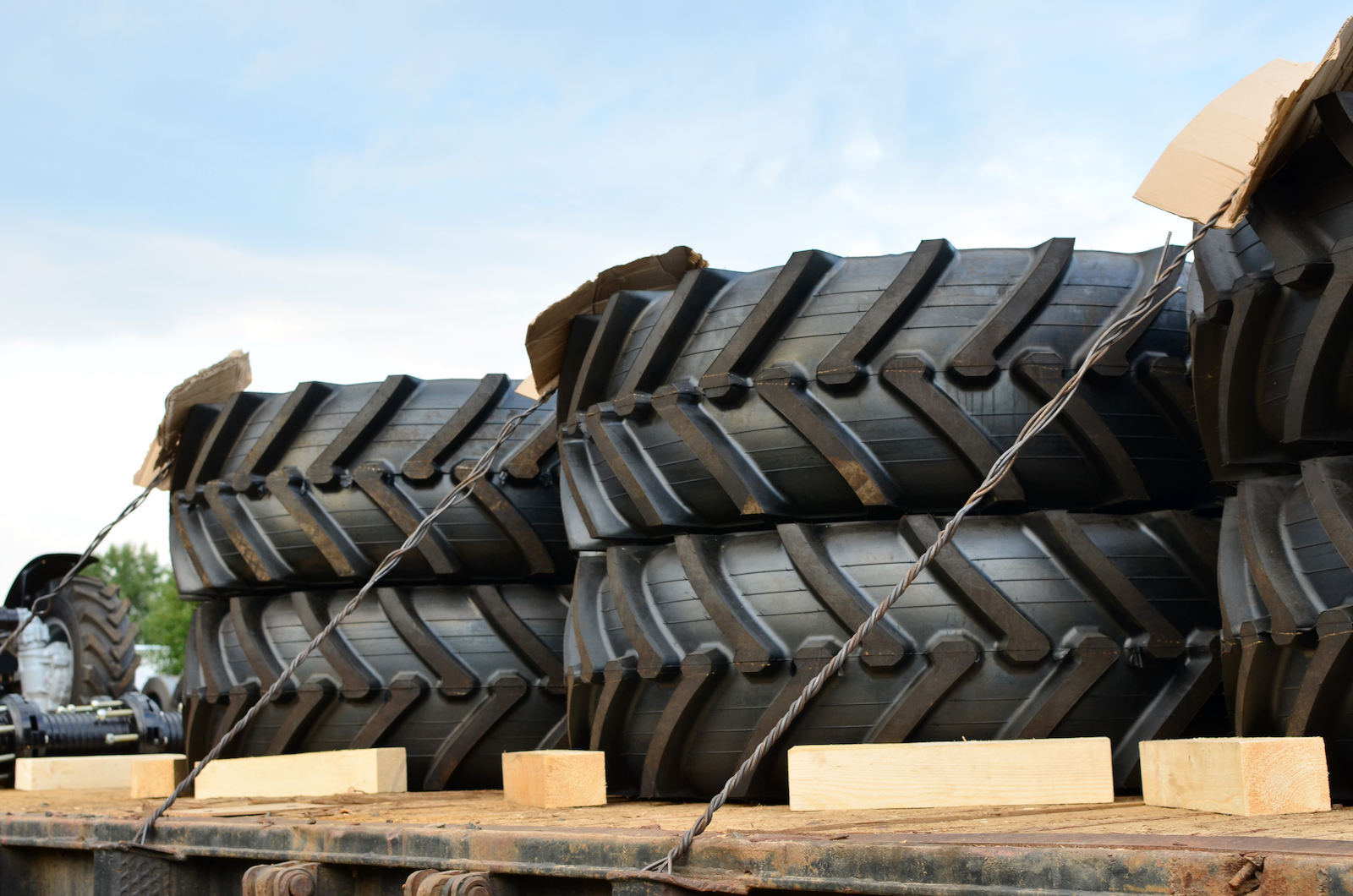Scott Syroka is a former Johnston city council member.
North American rail giant Canadian National announced on December 6 it would attempt to acquire the Waterloo-based short line railroad Iowa Northern Railway. Before that can happen though, the deal must undergo review by the U.S. Surface Transportation Board. The board should block this acquisition, and it’s not even a close call.
Short line railroads are the small and medium businesses of rail. Short lines like Iowa Northern Railway operate nearly half of all freight rail track in Iowa, according to the railroad interest group GoRail. These short lines run shorter distances and connect rural areas with larger, national rail networks.

THE LOCAL OPERATOR BEHIND IOWA NORTHERN RAILWAY
Daniel Sabin is the current chairman of Iowa Northern Railway. By all public accounts, he is a smart and talented businessman. According to a November 2011 profile on Sabin in Progressive Railroading, he was born into a railroading family in Manly, started out as a student train order operator, and worked his way up in the industry until purchasing the then-languishing Iowa Northern Railway short line railroad with a group of partners in the 1990s. This guy has trains in his veins.
Since then, Sabin has used his entrepreneurial skills to accomplish a magnificent turnaround of Iowa Northern Railway. While leading the company, he has focused on his customers, doing things like carefully maintaining track, leasing more powerful locomotives, and investing in workers to improve service.
These investments in people—both customers and workers—paid off big time during the crippling floods of 2008. Sabin had earned so much of his customers and workers’ trust and respect that they helped the company survive after flooding washed out 25 miles of track and made two major rail bridges impassable.
Several customers prepaid for future service to help provide Iowa Northern Railway with needed cash flow. Workers took pay cuts and reduced their schedules to four days per week. These are not the kind of sacrifices you make if you don’t care about the future of the company.
By making smart investments in the business, Sabin showed Iowa Northern Railway could provide better and more reliable service to attract customers. In short, Sabin is a model entrepreneur, improving his business while being rewarded with increased profit, too. It’s the kind of entrepreneurial spirit we can admire and be proud of as Iowans.
It’s also a wholly different business model from that of the giant rail corporations, including Canadian National, that together form the Big Rail monopoly.
BIG RAIL’S ALARMING BUSINESS PRACTICES
As business publication Supply Chain Dive reported in 2019, Big Rail was known even prior to pandemic-induced supply chain challenges for cutting jobs, closing rail yards, and driving service to “an all-time low.”
For Canadian National, increasing company efficiency meant cooking its books to increase executive bonuses and keep stock prices high according to a whistleblower lawsuit reported by CBC.
Meanwhile, the rest of us deal with the real-world consequences. Last year, The Wall Street Journal reported Big Rail’s business practices have resulted in fewer trains and increased delays, “…causing grain storage facilities to fill up, backing up fertilizer shipments and temporarily shutting down production at ethanol producing plants.”
Canadian National and other Big Rail corporations can do all of this without worrying about losing customers because of their monopoly power. According to the shippers interest group, the Rail Customer Coalition, the number of large railroads in the U.S. plummeted from 26 in 1980 to just seven in 2001. By consolidating, rail companies reduce competition and can wield their newfound market power to their liking.

Source: Rail Customer Coalition
In July 2022, the Financial Post ran a story headlined, “CN shares jump as railway demonstrates its pricing power amid surging inflation.” It noted financiers had taken favorably to Canadian National and considered it a good investment because of the company’s ability to “price above inflation”. So much for investing in a business because it outcompetes its peers on price, service, or quality.
WHAT HAPPENS IF THE ACQUISITION IS APPROVED?
According to the Quad-City Times, Iowa Northern Railway moves products like John Deere tractors, Tyson frozen foods and egg products, and even wind turbine components. That means if you go to a grocery store or restaurant, drive, or use electricity, you will likely see higher costs if this acquisition goes through.
Since 2001, rail rates have already risen two times faster than long-haul trucking rates and inflation due in large part to rail industry consolidation according to the Rail Customer Coalition. There’s no reason to believe Canadian National wouldn’t increase rates after acquiring Iowa Northern Railway. Those inflated rail rates are extra costs that will be passed onto you as the consumer.
Besides increasing inflation, this deal would result in a strip and ship effect, where dollars are stripped out of local towns and shipped elsewhere rather than invested locally. Small businesses that bolster Iowa’s economy, like the Cedar Rapids marketing firm Maudience that built Iowa Northern Railway’s website, would lose contracts for goods and services. Purchasing decisions would be outsourced to boardrooms dominated by financiers more familiar with Waterloo, Canada than Waterloo, Iowa.
With no reason to care about rail towns beyond how much wealth can be extracted out of them, Canadian National would sacrifice Main Street for Wall Street. Decisions on company governance issues like work schedules, infrastructure investments, and rail safety would be made far away from the people affected most by them.
CANADIAN NATIONAL’S REPUTATION PRECEDES IT
It’d be one thing if Canadian National were known for its good behavior, but it isn’t. According to the corporate and government accountability group, Good Jobs First, Canadian National has committed at least 655 safety, employment, consumer protection, or environment-related offenses since 2000, totaling nearly $18 million in assessed penalties.
These penalties were levied for a laundry list of bad behavior, including retaliating against whistleblowers, alleged racial discrimination against employees, and environmental violations due to what then-U.S. Attorney Erica MacDonald called “carelessness” in 2020.
For comparison, Iowa Northern Railway’s total number of offenses during the same period was just four, with the last one occurring more than a decade ago in 2011.
The facts aren’t good when it comes to Canadian National’s relationship with its workers either. The company has a history of bringing in scab workers to take their employees’ jobs when they’ve gone on strike, according to Canadian Dimension. If you’re lucky enough to hold onto your job, you get the privilege of being creepily spied on unknowingly and having your location tracked by your employer, as alleged by the Teamsters Canada union.
MIXED MESSAGES ON CANADIAN NATIONAL FROM IOWA NORTHERN RAILWAY
Maybe Canadian National deserves the benefit of the doubt, though. In a joint press release announcing the proposed acquisition, Iowa Northern Railway chairman Daniel Sabin said,
We believe CN shares IANR’s commitment to local stakeholders and that this transaction will be beneficial for customers, employees and the local Iowa economy. We are confident that, as part of CN, IANR will be able to continue to provide reliable first and last mile service to our local customers while providing them access to a much broader network and market.
I appreciate that vote of confidence, but could it be influenced at all by the prospect of a lucrative deal going through, the terms of which haven’t been publicly disclosed? If not, it’s a marked change from what Sabin had to say about Canadian National just a few years ago.
During a panel discussion at the 2020 Midwest Virtual Railroad Conference, the rail publication Trains reported Sabin’s belief that Canadian National’s business decisions caused “the loss of institutional knowledge as experienced local operating people were replaced or their positions eliminated.”
According to the report, Sabin also noted that Canadian National “changed local operating officials frequently” and “brought in people with no experience” while having “a condescending attitude.”
If Sabin truly believes what he said when announcing the proposed acquisition, he should at least explain why he believes Canadian National’s behavior will be different this time when it comes to taking over Iowa Northern Railway.
PROPOSED DEAL IS AN AFFRONT TO DEMOCRATIC WILL
Perhaps most importantly though, this proposed acquisition represents an affront to democratic will.
Since 2021 alone, the U.S. Department of Transportation (DOT) has awarded at least $13.9 million to Iowa Northern Railway, including an education and training grant to improve safety on short lines across the country and a grant to fund rail improvements specifically in rural areas.
The latter grant was large enough to cover “speed, safety, reliability and efficiency” improvement costs for more than 10 percent of Iowa Northern Railway’s entire track mileage – what the company told the Quad-City Times was their “largest one-time undertaking.”
It’s hard to imagine that policymakers’ intent in awarding short line-focused grants like these was to use taxpayer dollars to increase the attractiveness of short line railroads as potential acquisition targets for Big Rail and Wall Street.
To the contrary, U.S. DOT Secretary Pete Buttigieg noted at the time that the improvements were intended to “help fight inflation and control costs for shippers and consumers as well as create jobs” as part of the Federal Railroad Administration’s Consolidated Rail Infrastructure and Safety Improvements grant program.
That statement aligned with President Joe Biden’s previously-released Executive Order 14036 on “Promoting Competition in the American Economy.” The executive order, which carries the force of law, calls for a “whole-of-government approach” to address over-concentration, monopolization, and unfair competition in the American economy.
It also specifically charges the Surface Transportation Board with “…determining whether a merger, acquisition, or other transaction involving rail carriers is consistent with the public interest…” This proposed acquisition clearly is not.
If the board allows this acquisition to proceed, it will undercut democratic governance as it conflicts with our elected representatives’ words and actions in favor of what Wall Street wants.
Permitting the deal to move forward would fly in the face of Biden’s executive order promoting competition, Buttigieg’s public comments explaining the rationale behind DOT award decisions, and the intent of lawmakers of both parties in passing legislation like the Bipartisan Infrastructure Law that tripled funding for Consolidated Rail Infrastructure and Safety Improvements.
HOW YOU CAN HELP BLOCK THIS ACQUISITION
Fortunately, there is a way to stop this acquisition, but it requires you to act. The Surface Transportation Board is the independent federal agency with jurisdiction over rail restructuring transactions, including the power to approve or reject Canadian National’s acquisition attempt. The five-member board is expected to rule on the matter in 2024.
Concerned citizens should contact Chair Martin J. Oberman and the other members of the Board at rcpa@stb.gov or via their website, stb.gov, and ask them to block this acquisition.
You can craft your own message, or you can simply copy and paste this one:
Dear Chair Oberman and members of the Board,
As a concerned citizen, I’m writing to register my opposition to Canadian National Railway’s proposed acquisition of Iowa Northern Railway. This deal would increase prices, threaten safety, and decimate jobs.
Please follow the law, respect the will of the people, and use your power to block this acquisition.
Respectfully,
[YOUR NAME]
Ultimately, this seemingly arcane issue of one railroad trying to buy another is representative of another more fundamental question. Do we the people, through our elected representatives, get to govern ourselves? Or do unelected corporate monopolies like Canadian National get to govern us?
I know which world I want to live in, and that’s why I’ll be asking the Surface Transportation Board to block this deal.
Top image: Large wheels for agricultural equipment on a freight train; photo by Maksim Safaniuk, available via Shutterstock.


1 Comment
A dismal history may repeat itself
Excellent piece. The history of 20th century railroading was one of consolidations of the big carriers, followed by wholesale abandonment of small regional and branch lines to the detriment of rural America. It would be unfortunate if that history is repeated in the current century.
Dan Piller Thu 14 Dec 5:35 PM